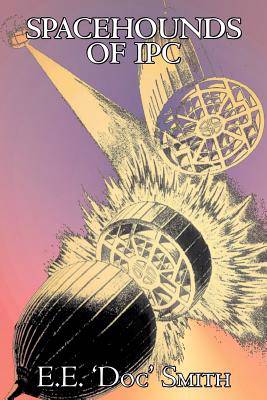
- Retrait gratuit dans votre magasin Club
- 7.000.000 titres dans notre catalogue
- Payer en toute sécurité
- Toujours un magasin près de chez vous
- Retrait gratuit dans votre magasin Club
- 7.000.0000 titres dans notre catalogue
- Payer en toute sécurité
- Toujours un magasin près de chez vous
Spacehounds of IPC by E. E. 'Doc' Smith, Science Fiction, Adventure, Space Opera
E E 'Doc' Smith, Ph D Edward SmithDescription
One of the most fascinating mysteries of the heavens is the comet. It goes through space, gets near enough to the earth to be seen, and then goes off and disappears in celestial distance. Often it has a hyperbolic orbit, which would make it impossible to come back. Yet it may return -- apparently contradicting the geometry of conic sections. This only goes to prove once more that it is risky to say anything is impossible. . . .
A good many of us who are now certain beyond a doubt that space travel will forever remain in the realm of the impossible, probably would, if a rocket that were shot to the moon, for instance, did arrive and perhaps return to give proof of its safe arrival on our satellite, accept the phenomenon in a perfectly blasé, twentieth century manner. Dr. Smith, that phenomenal writer of classic scientific fiction, seems to have become so thoroughly convinced of the advent of interplanetary travel that it is difficult for the reader to feel, after finishing Spacehounds of IPC, that travel in the great spaces is not already an established fact. Dr. Smith, as a professional chemist, is kept fairly busy. As a writer, he is satisfied with nothing less than perfection. For that reason, a masterpiece from his pen has become almost an annual event. We know you will like Spacehounds even better than the Skylark series.
Spécifications
Parties prenantes
- Auteur(s) :
- Editeur:
Contenu
- Nombre de pages :
- 204
- Langue:
- Anglais
Caractéristiques
- EAN:
- 9781603122498
- Date de parution :
- 01-05-07
- Format:
- Livre broché
- Format numérique:
- Trade paperback (VS)
- Dimensions :
- 152 mm x 229 mm
- Poids :
- 303 g

Les avis
Nous publions uniquement les avis qui respectent les conditions requises. Consultez nos conditions pour les avis.






